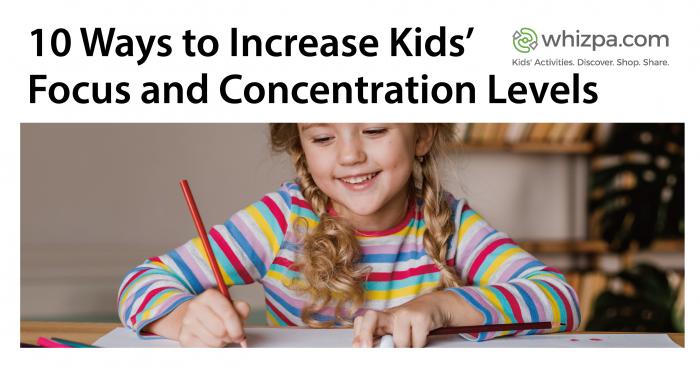
10 Ways to Increase Kids’ Focus and Concentration Levels
Kids these days are surrounded by a vast number of distractions. There is no dearth of gadgets in homes; the working parents are glued to their respective devices especially in the current phase of the pandemic. Additionally, given that many schools are now resorting to teaching via apps such as Zoom, the probability of your kids sneaking into simultaneous web chats with their friends or logging into their favourite websites when no one is watching increases manifold. Top it all, they are naturally energetic and it is unfair to expect them to stay still and robotic for extended periods of time.
It’s a huge challenge for school going kids to sit in one place, concentrate and study. We cannot expect the teachers at school to do the heavy-lifting for us. It is important to remember that your child spends half a day in the school in the middle of a class that usually has 25-30 other students. The probability of your child getting focused one-on-one attention at school for a substantial period of time greatly reduces. Home is where your child can get prolonged individualized attention during homework and this is where parents can greatly influence their concentration abilities.
Let’s see what we as parents and caregivers can do to increase their attention timespan and have them feel more focused and aware throughout the day.
1. Diet – Diet is a critical determinant of how well a child concentrates. While food high in sugar, soda, white carbs tend to make a child sluggish, foods rich in protein such as dried fruits, eggs, and lean meat can help keep their mind and body healthy and sharp. Experts say that eating greens and fruits injects the body with antioxidants which in turn boosts brain power. Simply paying attention to what our children eat, serving them natural diets which are high in fibre and low in sugar, and cutting out the processed food as much as possible can be truly beneficial.
2. Water – Dehydration can have a negative impact on concentration levels. It is important we keep reminding our children to keep themselves well hydrated throughout the day, offer them a glass every time we get up to drink water ourselves, or ensure they carry their water bottles to school every day.
3. Sleep – Poor sleeping habits have a direct correlation with a child’s focus and concentration levels. Make sure that your child gets enough sleep hours per their age groups. WebMD recommends that:
1- to 3-year-olds need 12 to 14 hours of sleep
- 3- to 6-year-olds need 10 to 12 hours of sleep
- 7- to 12-year-olds need 10 to 11 hours of sleep
- 12- to 18-year-olds need 8 to 9 hours of sleep
4. Routine - Having a fixed routine can help children have a reliable frame of reference. A simple routine like ‘once you are back from school, change your clothes, have a snack, spend 30 mins on homework/home study, followed by 20 mins of screen time” can make them feel in control of their day as they are aware of what all tasks are going to follow soon.
5. Exercise – Physical activity stimulates the brain and makes concentrating easy. A simple activity of running with friends, or walking to school not only has health benefits but has proven to be good for concentration levels too
6. Emotions – Nothing fuels distraction more than stress or worry. We don’t have to go too far to see this correlation. If we are worried about an office task or stressed about a relationship with a co-worker, it impacts our performance at work and affects our ability to ‘be present’ at home. Children are no different. If you suspect your child is worried or anxious about something at school or within their social circle, it’s best to talk it out with them. Unless and until you have a solution to their problems, you cannot expect a child to sit and focus on their curriculum.
7. Games – Indulging your kids in some age-appropriate games can help improve their concentration and focus and self-regulation abilities.
- Spot the difference –There are plenty of ‘spot the difference’ puzzles available online that you can print for your kids. These puzzles encourage kids to look at the 2 pictures simultaneously for an extended period of time and look at the details, thereby increasing their ability to focus.
- Tongue Twisters – You can pick a tongue twister or two online with varying levels of difficulty for your kids and challenging them to say it speedily after practice guarantees a great brain workout. Some of the popular ones are: a) “I saw Susie sitting in a shoe shine shop. Where she shines, she sits, and where she sits, she shines”, b) “She sells sea shells by the seashore. And the shells she sells by the seashore are sea shells for sure.”
- What’s missing? - Read a sequence of numbers, alphabets or words from their favourite rhyme or story but skip a number/alphabet/word/scene in the process. Ask your little one to focus closely to spot the missing item. This can be a fun and entertaining brain workout for enhancing concentration levels.
8. Time limits - Parents can think of setting a time limit for the goal to be completed. For instance, if you want your child to read a novel, you can ask them to read 10 pages within twenty minutes. That said, while some kids may enjoy these time limits and love to see it as a challenge, others may lose focus and feel anxious. You need to know how your child perceives this concept of ‘time-limits’ and then decide if this may work for them.
9. Break it down - Children have small attention spans. If you want them to do a laborious task, it would be wise to slice it up into smaller chunks. For a one-hour school project, you can divide into 3 sections of 20 mins each and allow your kid a downtime of 5-10 mins in between. No, they don’t get screen time but they can doodle, draw, have a quick snack, breathe in some fresh air, play with their dinosaur and then come back to the main task.
10. Calm Zone - Having a specified room or corner free of any distractions such as screens or loud noises can facilitate easier concentration for kids. You can even have them do some deep breathing exercises before they sit for their project to reduce any signs of exhaustion, anxiety or restlessness.
Each child is unque and may pick up concentration skills via different methods. Parents can start with a couple of the methods that they think are relatively easy to adopt and decide which ones are worth continuing and which ones need further tweaks.
How do you train your child to focus better? We would love to hear from you.








